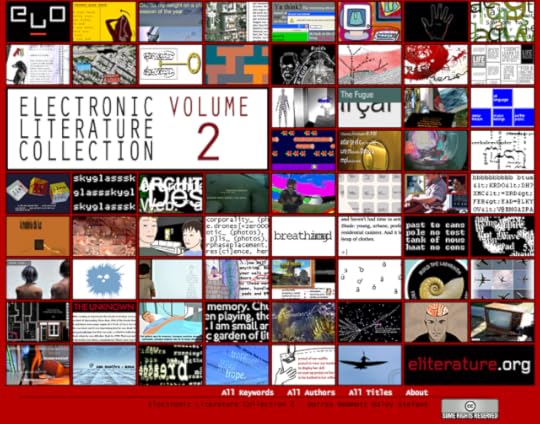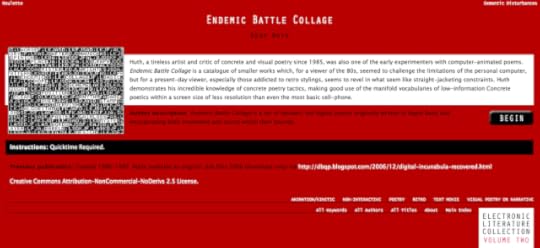Geof Huth's Blog, page 37
February 9, 2011
ELC2

Tonight, I learned the Electronic Literature Collection: Volume 2 has been released, online and ready for use immediately. There is plenty of good and various work in this collection, and I've barely had anytime to look at the work, but part of my interest in this is that work of mine is included in the collection.

Specifically, my "book" of thirteen digital poems, ENDEMIC BATTLE COLLAGE, appears herein, in a video version you can watch like a movie, but the page includes a link out to the actual files of this ancient set of digital poems. These poems are almost a quarter of a century old now, but I still enjoy them, particularly "HAVOC," the most complicated of the poems, which begins at about the 4:45 mark in the file. To watch the entire book, you'll have to put aside 8 minutes and 11 seconds of your life.
It may be worth it. But I sure can't guarantee it.
ecr. l'inf.
http://collection.eliterature.org/2/w...
Published on February 09, 2011 19:21
February 7, 2011
Books Read in January 2011
Read a shockingly small number of books in the first month of the year. And none in the second half of the month. Was terribly busy with professional work and I lost my grip on books. Sad. Because reading is the only thing that I do that might be called relaxing. Did watch films though, as obsessively as last year. Somehow, I have limits. But those books read were good. Loved most of them. And wrote about six of the seven I wrote. Not making much better progress this month. One book read, I think. And reading a second longer one, but slowly. Hey, I don't even have time for complete sentences these days.
January 2, 2011
1. Riggs, Sarah. 60 Textos. Ugly Duckling Presse: Brooklyn, N.Y., 2010.
January 3, 2011
2. Truscott, Mark. Nature. BookThug: Toronto, 2010.
January 4, 2011
3. Bervin, Jen. the silver book. Ugly Duckling Press: Brooklyn, 2010.
January 6, 2011
4. aND, mIEKAL. O'er. i'mprint deluxe: [West Lima, Wisc.], 2010.
January 8, 2011
5. Nelson, Maggie. Bluets. Wave Books: np, 2009.
6. Grumman, Bob. A Preliminary Taxonomy of Poetry. The Runaway Spoon Press: Port Charlotte, Fl., 2010
7. Kasper, M. Open-Book. Ugly Duckling Presse: Brooklyn, N.Y., 2010.
ecr. l'inf.
January 2, 2011
1. Riggs, Sarah. 60 Textos. Ugly Duckling Presse: Brooklyn, N.Y., 2010.
January 3, 2011
2. Truscott, Mark. Nature. BookThug: Toronto, 2010.
January 4, 2011
3. Bervin, Jen. the silver book. Ugly Duckling Press: Brooklyn, 2010.
January 6, 2011
4. aND, mIEKAL. O'er. i'mprint deluxe: [West Lima, Wisc.], 2010.
January 8, 2011
5. Nelson, Maggie. Bluets. Wave Books: np, 2009.
6. Grumman, Bob. A Preliminary Taxonomy of Poetry. The Runaway Spoon Press: Port Charlotte, Fl., 2010
7. Kasper, M. Open-Book. Ugly Duckling Presse: Brooklyn, N.Y., 2010.
ecr. l'inf.
Published on February 07, 2011 20:50
February 6, 2011
A Poetics (66 - 68)
Astoria, New York
66. Defining
My work in poetry is a project to help expand the definition of poetry, to move the poem off the pages and out of the air, to the screen and into the body, to make the poem an expression of language, even if muffled, even if humbled out of sense, that will captivate more than speaking, that will be a more heightened state of living within the realm of language in all of its forms: semantic, syntactic, visual, sonic, personal, corporeal, social, and performative.
67. Verbal
Gustaf Sobin claimed that "the poem is verbal, rather than nounal," because he imagined only one poem, and, as with any poet, he imagined only the poems he made, poems of the voice and sound, poems of movement and reverberating sound, poems that are rich, like sweet butter, with sound. His were and are poems of water and wind, of the movements of nature, and of mind within that world. But all poems are not, and all poems don't need to be. Some poems are individual words, where the poem has to begin, with the first sound of any word. Some poems are pwoermds, which often appear to be nouns, which are motionless, except in the mind, except through the mind. A poem always moves somewhere and –how, but not always with verbs.
68. Music
Poemas musicas. Poems as music. Those poems that move in the direction of music but are not quite music. Those poems of the ear, the sound setting the sequence of the sound to follow. These are poems for the tongue, too, for the tongue is meant to speak them, even if they live their lives being heard within the ear without ever hitting the air, without ever vibrating through and out of the body. A poem tends to music that tends to want to affect the emotion of a body, as a human is always a body, as a human is always a mind moving, and sometimes towards sound.
ecr. l'inf.
66. Defining
My work in poetry is a project to help expand the definition of poetry, to move the poem off the pages and out of the air, to the screen and into the body, to make the poem an expression of language, even if muffled, even if humbled out of sense, that will captivate more than speaking, that will be a more heightened state of living within the realm of language in all of its forms: semantic, syntactic, visual, sonic, personal, corporeal, social, and performative.
67. Verbal
Gustaf Sobin claimed that "the poem is verbal, rather than nounal," because he imagined only one poem, and, as with any poet, he imagined only the poems he made, poems of the voice and sound, poems of movement and reverberating sound, poems that are rich, like sweet butter, with sound. His were and are poems of water and wind, of the movements of nature, and of mind within that world. But all poems are not, and all poems don't need to be. Some poems are individual words, where the poem has to begin, with the first sound of any word. Some poems are pwoermds, which often appear to be nouns, which are motionless, except in the mind, except through the mind. A poem always moves somewhere and –how, but not always with verbs.
68. Music
Poemas musicas. Poems as music. Those poems that move in the direction of music but are not quite music. Those poems of the ear, the sound setting the sequence of the sound to follow. These are poems for the tongue, too, for the tongue is meant to speak them, even if they live their lives being heard within the ear without ever hitting the air, without ever vibrating through and out of the body. A poem tends to music that tends to want to affect the emotion of a body, as a human is always a body, as a human is always a mind moving, and sometimes towards sound.
ecr. l'inf.
Published on February 06, 2011 14:20



